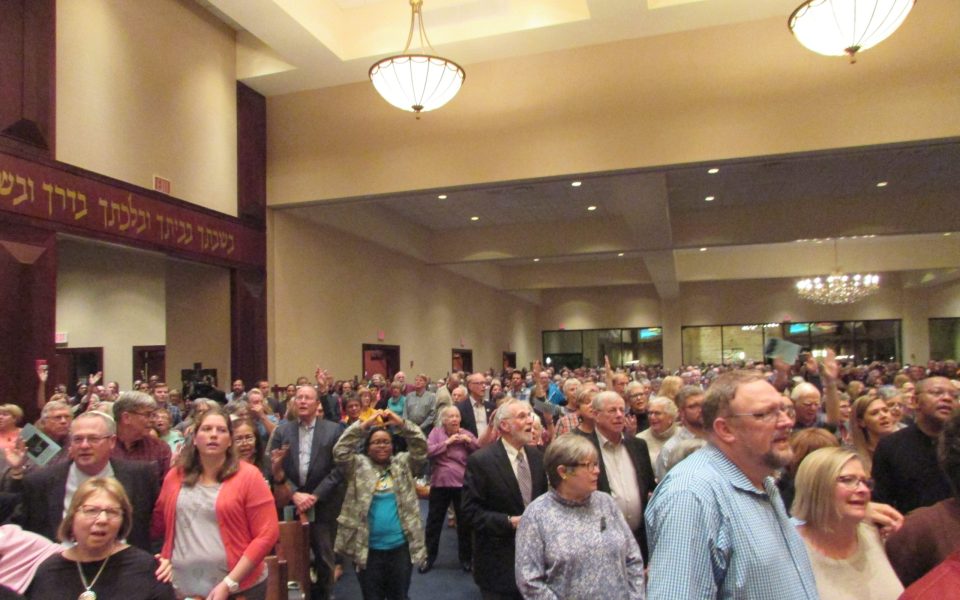They filled the sanctuary at Temple Emanuel beyond its 900-person capacity. Some of them sat on the floor in the aisles and others took seats in the wings or milled in the foyer.
The line of cars heading towards the Greensboro synagogue backed up two blocks on Jefferson Road, sending attendees down side streets in search of parking.
A rough survey of the crowd gathered to remember 11 Jewish worshipers massacred during Shabbat services on Oct. 27 at Tree of Life in Pittsburgh revealed that roughly three in four were non-Jews. Clergy from the Jewish, Christian, Muslim, Buddhist and Hindu faiths came to honor the victims and the divine light that holds all life sacred. Dozens of politicians of both parties, from Mayor Nancy Vaughan (D) to US Rep. Mark Walker (R), salted the crowd. Fred Guttman, the senior rabbi at Temple Emanuel, gave them an opportunity to state their name and the office they hold — or the one they seek as a candidate — but admonished the audience that it wouldn’t be appropriate to applaud them.
Guttman’s words were pointed. The massacre was a “wake-up call,” he said, alluding to the shooter’s post on the social media platform Gab indicating that his crime was motivated by a hatred of the organization Hebrew Immigrant Aid Society, which he accused of bringing “invaders” to the United States. Guttman said the massacre “came in the midst of an incitement of fear against immigrants — men, women and children — whose only desire is to come to this blessed land. The fear of an immigrant mob seeking to overtake our country is not well founded, and appeals to the basest prejudices of many.”
Anti-Semitic events have increased by about 60 percent over the past two years, by the count of the Anti-Defamation League.
“It was slightly more than a year ago when Klansmen and neo-Nazis marched in Charlottesville saying, ‘Jews shall not replace us,’” Guttman recalled. “We have also seen politicians demonizing wealthy Jewish donors and the so-called ‘Hollywood elite.’ These dog-whistle attacks deserve to be called out for what they are: vicious appeals to the worst impulses of antisemitism. Whenever we see attacks on people like George Soros, Michael Bloomberg and others, we should realize that by pointing out Jewish donors only, candidates for office, politicians and our leaders are encouraging antisemitism.
“But tonight, we understand that this is not only a Jewish problem,” he continued. “The past few years has seen the ripping open of a vicious underbelly of bias, bigotry, racism, homophobia, sexism and antisemitism in our country. The fabric of American society has been severely torn.”
He pledged that “Jews will not cower in fear.” He said Jews will continue practicing their faith and following the tradition of tikkun olam, which means “to repair the world.”
Later, when the Rev. Julie Peeples read a statement from the Greensboro Faith Leaders Council calling “on all elected officials to publicly reject the hate speech and fearmongering so prevalent in our current political climate,” the crowd responded with sustained applause. And when she followed by saying, “We publicly denounce the rising tide of white nationalism,” they rose to their feet.
Despite the unity of spirit at Temple Emanuel, there was little sense of safety. And nor should there be.
Kathleen Belew, whose masterful book Bring the War Home traces the history of the white power movement from the Greensboro Massacre through the 1995 Oklahoma City bombing, wrote on Twitter on Sunday that the Pittsburgh shooter was clearly motivated by white power ideology, whose components include not only antisemitism, but also “anti-immigration, white supremacy, white theologies and violence.” To ignore the other components “contributes to understanding such events as one-off attacks, acts of lone wolves, madmen, etc.,” she wrote. “The historical archive shows us that these events tend to be connected not only to one another, but to more public-facing rhetoric and activism.”
For antifascist activists who have been tracking and combating the rise of the so-called alt-right since Trump’s election, the carnage at Tree of Life comes as bitter and sorrowful vindication.
Emily Gorcenski, a data scientist who was drop-kicked by a member of the white supremacist group Rise Above Movement during the torch rally at the University of Virginia on Aug. 11, 2017, issued an anguished tweet storm hours after the Pittsburgh shooting.
“There will be more of this,” she wrote. “Some of us put everything in our souls to fight against this. I don’t know what to tell you right now. I don’t have words. I just have the body of work I’ve dedicated the past two years of my life to. We have to fight, we have to pick sides, because his won’t get better. I put every moral weapon in my arsenal into play to try to prevent this. I shouted about Charlottesville. I shouted about the court cases. I shouted about the terror networks forming in plain site on Gab…. All of this to say: This was preventable. We could have prevented this. We could have stopped this.”
What will we do to stop the next attack? And the next? And the one after that?
Join the First Amendment Society, a membership that goes directly to funding TCB‘s newsroom.
We believe that reporting can save the world.
The TCB First Amendment Society recognizes the vital role of a free, unfettered press with a bundling of local experiences designed to build community, and unique engagements with our newsroom that will help you understand, and shape, local journalism’s critical role in uplifting the people in our cities.
All revenue goes directly into the newsroom as reporters’ salaries and freelance commissions.


Leave a Reply